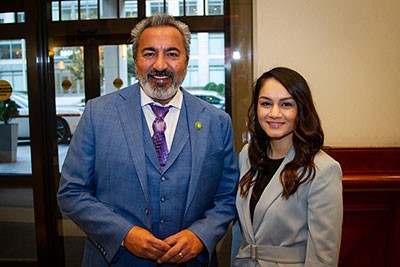What We Do
AUAPAC gives urologists throughout the country a strong voice in our nation's capital. AUAPAC identifies and supports federal candidates who understand and care about the policy issues critical to urologic specialists and their patients.
AUAPAC is proudly non-partisan and strives to protect and advance the urology specialty and urologic patients by supporting federal candidates from both parties. AUAPAC is an important way to advance a legislative agenda reflecting the diverse priorities of the urologic community.
Transparency is of the utmost importance to AUAPAC. Learn what candidates that AUAPAC has supported during this election cycle (2023-2024) and previous election cycles.
AUAPAC Makes an Impact By
- Engaging members of Congress in congressional leadership offices, as well as those members on committees with jurisdiction on health policy, including:
- House Ways & Means
- House Energy & Commerce
- Senate Finance
- Senate Health, Education, Labor & Pensions
- House/Senate Appropriations Committee
- Participating in Washington D.C.-based and home district fundraisers, as well as in multi-PAC events.
- Connecting AUA members with their lawmakers through in-district fundraisers, donor appreciation events at the AUA Summit, and more.
|
Representative Ann Kuster (D-NH-02) and E. Ann Gormley, MD, at an in-district fundraiser |
Representative Ami Bera, MD, (D-CA-06) and Ruchika Talwar, MD, at an AUAPAC fundraiser during the AUA Summit |
Representative Mike Kelly (R-PA-16) and AUAPAC Chair Robert Bass, MD at a Washington, DC fundraiser |
AUAPAC’s Advocacy Priorities
- Federal Quality Reporting– Ensuring that implementation of MACRA improves quality of care while not overburdening providers.
- Medical Liability Reform– Promoting traditional medical liability reform, caps on noneconomic damages, expert witness reform, a sliding scale of attorney contingency fees, and "safe harbor" laws that protect physicians who utilize best-practice guidelines.
- Medicare Physician Fee Schedule– Protecting urology services from negative payment adjustments identified through review of misvalued code screenings under the Medicare Physician Fee Schedule.
- Prior Authorization– Working to streamline prior authorization requirements for Medicare Advantage providers.
- Prostate Cancer Screening– Preserving access to appropriate prostate-specific antigen screening and the ability of physicians and patients to collaboratively choose the best prostate cancer treatment model without government interference.
- Quality Clinical Data Registries (QCDRs) and Quality Measures– Ensuring that QCDRs are protected as a mechanism for urologists to report on relevant measures.
- Research Funding– Securing and protecting urologic research funding.
- Urology Workforce Shortage– Addressing workforce shortages in all urologic access practice environments, preserving access to appropriate and timely care, expanding access to care with innovations, including telemedicine, and advocating for increased graduate medical education (GME) funding and resources for urology positions.



